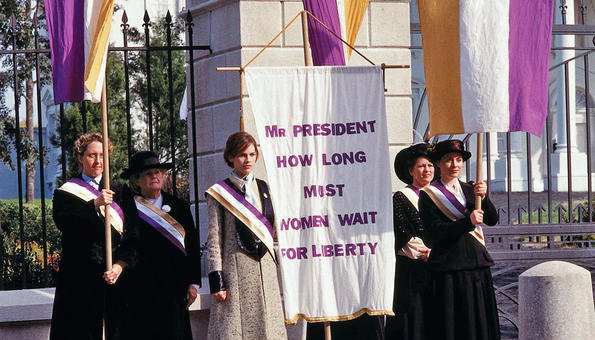After the Election: What’s Next in History Class?
A MiddleWeb Blog

Our school is near Los Angeles, so distraught won the day by a landslide. California voted 61 percent for Clinton and 33 percent for Trump, and my school is also a liberal island.
In a Survey Monkey poll for president our 8th graders took on Election Day, 59 percent voted for Clinton, 17 percent voted for Trump, 5 percent voted for “other” and 19 percent preferred not to vote for anyone.
Wednesday, we started class with 10 minutes of writing, which took the form either of a journal entry or a letter to one of the candidates, as suggested in an excellent blog post on election postmortems. I said I would not read any of the writing – this was purely emotional venting. Students wrote and wrote, silently, intently, before voicing their opinions to a friend.
When I despair of the vitriol that has arisen this election season, I both wish I didn’t have to discuss politics in the classroom and am so glad that I have to discuss politics in the classroom. It’s a burden and a blessing.
Here’s how I plan to carry that blessing and burden going forward.
1. Keep talking about current events, relentlessly
Already we discuss the news just about every day in class. Sometimes I’ve wondered if we are taking too much time away from pure history by doing so. Today I remembered so clearly that current events both show students who they are – through the articles they choose to follow –and what their country is and could be.
2. Keep discussing civics and Constitutional issues
After a debate on abolishing the electoral college in October, I was proud of my students’ understanding of the system as it played out in real time on election eve. After discussing the current vacancy on the Supreme Court in our Constitution unit this fall, I was thrilled that students remembered that the President-elect will nominate a justice for the Senate to approve. Understanding the mechanics of our political system gives students power, whether or not they agree with the party wielding it.
3. Keep relating then to now
Today a history colleague sent around a piece comparing the appeal of Andrew Jackson to Donald Trump. Historical parallels instruct, with lessons both logical and characterological. We can look to history not only for examples of populists who rally darker emotions but also for examples of reformers who inspire change.
4. Connect history to service
Already our eighth-grade team asks students to complete a semester-long community impact project. Guided by our science teachers, students follow a passion into the community to see where they can make a difference. In English they read inspirational books, from The Red Bandanna to Just Mercy to The Reason I Jump. In history they do background research on their projects’ underlying topics, from poverty to autism to police brutality.
We can always do more to show our middle schoolers examples of people helping. We can always remind them, again, that what they learn with us not only shapes their own minds but trickles out into the communities they drive through, live in and help form.
5. Give students unforgettable visuals of changemakers
This year I had already been thinking of devoting our fourth quarter of U.S. history to meaningful films, such as Glory, All the President’s Men, Iron-Jawed Angels or High Noon. Now I’m even more intrigued by the thought of teaching several of these films – giving extensive background through primary sources – so that the characters are forever etched in students’ minds, whether that’s Gary Cooper as Marshal Will Kane or Hilary Swank as suffragette Alice Paul.
In middle school, history is about identity
Ultimately, teaching middle school history means teaching identity. It’s our job to give examples. It’s our students’ job to internalize what they agree with, set aside what they don’t, and grow into the human beings we know they can become.
Here’s hoping this election season becomes the catalyst for all kinds of growth, for them as people and for me as their teacher.
































Sarah, I applaud your efforts to take the bull by the horns (so to speak). An excellent time to relate history to current events. I also love the relationship of language arts to the history class.
I heard this just recently. The challenge is to have everyone, adults and students, read a story from a person from a different culture, to learn about his or her story, from their point of view. To have understanding of yourself and other’s identity is what we need more of. It will help in civil discourse rather than using code words, inciting anger and misunderstanding.
Great teaching!
Judy, thank you for your nice comments and for your welcome emphasis on helping middle schoolers understand others’ identities as well as their own.
Sarah, although I’m retired, I taught high school English in a community near you in the days of the electives. I taught a class called “Mass Media” among others, and we watched commercials and studied propaganda techniques and logical fallacies and also went on a field trip to see All the President’s Men. I applaud your commitment to teaching critical thinking. Keep doing what you’re doing!
Mary, media literacy seems more important than ever these days. I really enjoyed this post today, and #4 addresses the topic: http://www.cultofpedagogy.com/election/. Thanks for your kind words. I’m curious as to where you taught!